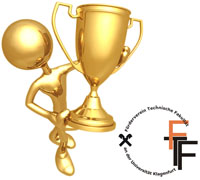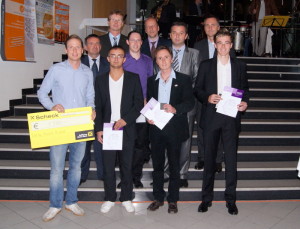 … ist der Titel der besten Diplom- bzw. Magisterarbeiten aller Studien der Technischen Fakultät an der Universität Klagenfurt und wurde vom Förderverein Technische Fakultät mit EUR 1500,– ausgezeichnet. Der Autor und Preisträger, Herr Dipl.-Ing. Hendrik Husstedt, ist nun Mitarbeiter am Institut für Intelligente System-technologien in der Forschungsgruppe “Angewandte Mechatronik“, und arbeitet dort als wissenschaftlicher Mitarbeiter unter anderem an seiner Dissertation. Der Preis wurde im Rahmen der Eröffnung des akademischen Jahres 2011/2012 übergeben und wir möchten seine Diplomarbeit kurz vorstellen.
… ist der Titel der besten Diplom- bzw. Magisterarbeiten aller Studien der Technischen Fakultät an der Universität Klagenfurt und wurde vom Förderverein Technische Fakultät mit EUR 1500,– ausgezeichnet. Der Autor und Preisträger, Herr Dipl.-Ing. Hendrik Husstedt, ist nun Mitarbeiter am Institut für Intelligente System-technologien in der Forschungsgruppe “Angewandte Mechatronik“, und arbeitet dort als wissenschaftlicher Mitarbeiter unter anderem an seiner Dissertation. Der Preis wurde im Rahmen der Eröffnung des akademischen Jahres 2011/2012 übergeben und wir möchten seine Diplomarbeit kurz vorstellen.
Kurzfassung:
In der Diplomarbeit werden Verfahren entwickelt, um die Prüfgenauigkeit von magnetischen Drehzahlsensoren zu verbessern. Die zu prüfenden Sensoren werden im Automobil eingesetzt und entstammen der neusten Generation von Drehzahlsensoren auf Basis des GMR -Effekts (GMR=Giant magnetoresistance). Die Ergebnisse der Arbeit tragen dazu bei, die Genauigkeit dieser Sensoren zu erhöhen und deren Herstellungskosten zu senken. In der Folge liefert die Arbeit einen Beitrag für die Verbesserung von Sicherheitssystemen, wie Antiblockiersystem (ABS) und Elektronisches Stabilitätsprogramm (ESP), und für die Senkung des Spritverbrauchs im Automobil.
Moderne Automobile besitzen eine Vielzahl von Sensoren, deren Anzahl zukünftig noch weiter steigen wird. In der Automobilindustrie werden im Wesentlichen zwischen Sensoren für die drei Bereiche Antriebsstrang, Sicherheit und Komfort unterschieden. Sowohl im Antriebsstrang als auch im Sicherheitsbereich kommen Drehzahlsensoren zum Einsatz. Diese Sensoren messen die Drehgeschwindigkeit zum Beispiel von Nocken- oder Kurbelwelle und liefern damit wichtige Informationen für die Motorsteuerung und für Sicherheitssysteme, wie ABS und ESP. Beispielsweise sind Drezahlsensoren bei der Motorsteuerung unerlässlich, um den optimalen Zündzeitpunkt zu bestimmen und die Realisierung Energie effizienter Motoren zu ermöglichen.
Die Anforderungen an Sensoren im Automobilbereich sind ähnlich hoch, wie in der Luft- und Raumfahrt. Die wesentlichen Forderungen sind hohe Zuverlässigkeit, geringe Kosten, hohe Genauigkeit, kleine Bauweise und ein großer Betriebsbereich. Unter diesen Forderungen haben sich im Bereich der Drehzahlsensoren berührungslose, integrierte, magnetische Sensoren etabliert. Die integrierte Bauweise erlaubt eine preisgünstige Herstellung und kleine Abmessungen von wenigen Millimetern. Das berührungslose Messverfahren verhindert nahezu jeglichen mechanischen Verschleiß durch Reibung. Außerdem sind die magnetischen Messungen robust gegenüber Verschmutzungen, Vibrationen, Feuchtigkeit und Temperaturänderungen. Dadurch werden eine hohe Zuverlässigkeit und eine lange Lebensdauer ermöglicht.
Die ersten magnetischen Drehzahlsensoren beruhten auf einem nicht integrierten, induktiven Messprinzip. Heute kommen zum größten Teil Sensoren mit integrierten Hallsonden zum Einsatz und die neuste Generation von Drehzahlsensoren ist auf Basis des GMR-Effekts realisiert. Durch den Einsatz des GMR-Effekts kann die Genauigkeit gegenüber Sensoren mit Hallsonden bis zu einem Faktor von zehn erhöht werden. Um die hohe Genauigkeit zu erzielen und eine hohe Zuverlässigkeit zu garantieren, muss jeder Sensor am Ende der Produktion einen Abschlusstest durchlaufen. In diesem Test wird die komplette Funktionalität des Sensors in einem Temperaturbereich von ?40°C bis +180°C getestet. Dieser Test entscheidet, ob ein Sensor ausgeliefert oder aussortiert wird. Zudem werden Kalibrierungsparameter gemessen und im Sensor gespeichert. Nur mit diesen Parametern kann eine hohe Genauigkeit erreicht werden.
Der Abschlusstest wird mit einem speziell entwickelten Magnetkern, der das Magnetfeld aus der Applikation nachbildet, realisiert. In der Produktion wird jeder einzelne Sensor über dem Magnetkern genau positioniert und der Kern generiert an der Stelle des Sensors das gewünschte Magnetfeld. Die Präzision des Testfeldes ist für die Genauigkeit und Kosten der Drehzahlsensoren von entschiedener Bedeutung. Je genauer das Testfeld ist, umso genauer können die Sensoren kalibriert werden. Die finanzielle Bedeutung der Prüfgenauigkeit liegt in der Ausbeute. Darf ein Parameter beispielsweise um ±5% schwanken und der Parameter kann nur auf ±3% genau getestet werden, müssen alle Sensoren, die eine Abweichung über ±2% aufweisen, aussortiert werden. Bei der hohen Stückzahl von Sensoren bringen Erhöhungen der Ausbeute im Prozentbereich große finanzielle Einsparungen.
Um eine Aussage über die Genauigkeit des Magnetkerns treffen zu können, muss der Bereich, an dem die zu testenden Sensoren positioniert werden, magnetisch untersucht werden. Dafür stehen ein magnetischer Referenzsensor und eine Lasersensor in Kombination mit einer dreidimensionalen Verfahreinheit (xyz-Tisch) zur Verfügung. Mit dem Lasersensor soll die Position, an der sich die zu testenden Sensoren befinden, ermittelt werden und mit dem Referenzsensor soll in diesem Bereich das Magnetfeld analysiert werden. Da der Magnetkern stark inhomogene Felder erzeugt, führen kleine Positionsabweichungen und Ausrichtungsfehler zu großen Messfehlern. Deshalb liegt die Hauptaufgabe und der Schwerpunkt der Diplomarbeit in der Bestimmung der Ausrichtung und Position des magnetischen Referenzsensors im Messaufbau. Nur mit einem genau kalibrierten Referenzsensor kann das Feld des Magnetkerns untersucht werden.
Für die magnetischen Messungen werden Hallsonden und GMR-Sensoren eingesetzt und die zugrunde liegenden Messverfahren theoretisch erläutert. Der verwendete Referenzsensor besitzt 15 Hallsonden und 5 GMR-Sensoren auf einem Siliziumchip. Diese Anzahl von Sensorelementen wird in Kombination mit speziellen Referenzkörpern ausgenutzt, um die genaue Ausrichtung des Referenzsensors zu bestimmen. Des Weiteren werden die Referenzkörper zur genauen Positionsbestimmung des magnetischen Sensors herangezogen. Sowohl die Messalgorithmen als auch die benötigten Referenzkörper werden im Rahmen der Diplomarbeit entwickelt. Dies beinhaltet Simulationen mit Hilfe der Finiten-Elemente-Methode, die externe Fertigung und Messungen am realen Aufbau. Mit den praktischen Ergebnissen wird die Genauigkeit der magnetischen Messalgorithmen abgeschätzt. Im letzten Teil der Arbeit wird auf die geometrische Messung mit Hilfe eines Triangulationslasers eingegangen. Dabei wird das Messverfahren erläutert und Messprobleme in der Praxis erklärt. Eine Schwierigkeit besteht in der exakten Ausrichtung des optischen Sensors im Messaufbau. In diesem Zusammenhang werden die entstehenden Verzerrungen analytisch hergeleitet und eine Möglichkeit zur Messung der Neigung präsentiert.
zp8497586rq

 Technik Studieren & Erleben
Technik Studieren & Erleben



 as Praktikum läuft bis jetzt sehr gut und die Kollegen sind wirklich sehr nett und hilfsbereit. Ich habe meine Arbeitszeit damit verbracht die Adobe Produkte für Videostreaming, Playback und Enhancement auf Desktopsystemen und Android Smartphones zu untersuchen. Dabei habe ich mich speziell mit Streamingmethoden wie dynamisches HTTP Streaming und Video Processing am Client auseinandergesetzt. Alle Details kann ich aber leider nicht verraten 😉
as Praktikum läuft bis jetzt sehr gut und die Kollegen sind wirklich sehr nett und hilfsbereit. Ich habe meine Arbeitszeit damit verbracht die Adobe Produkte für Videostreaming, Playback und Enhancement auf Desktopsystemen und Android Smartphones zu untersuchen. Dabei habe ich mich speziell mit Streamingmethoden wie dynamisches HTTP Streaming und Video Processing am Client auseinandergesetzt. Alle Details kann ich aber leider nicht verraten 😉

